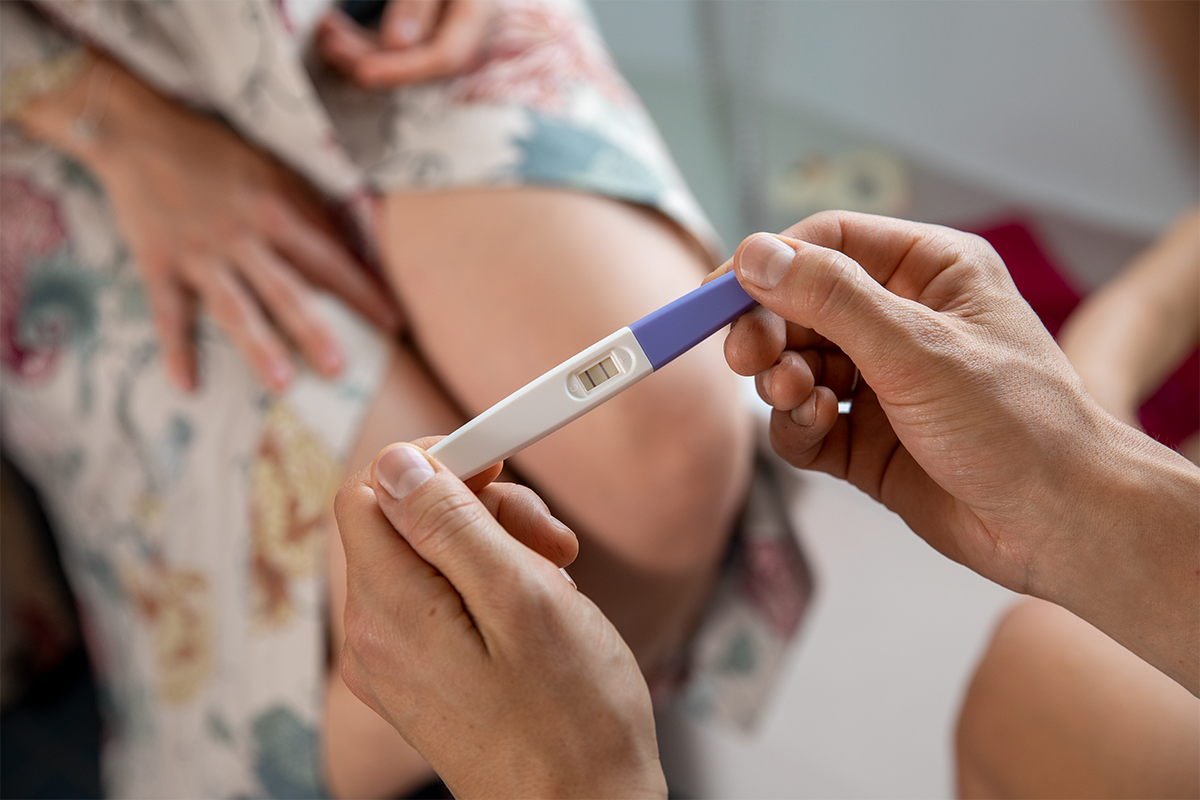How to improve the chance of getting pregnant

If you are longing for a child, there are a number of things you can do – and avoid – to improve the chance of getting pregnant, regardless of whether you are the one who wants to get pregnant or an expectant partner.
When you have finally made the big decision to try to have a child, it is usually difficult to remain patient. We are used to being able to plan for the future when it comes to both major and minor decisions in life, but planning and achieving a pregnancy is seldom simple. There are lots of reasons (related to both women and men) why a pregnancy can take time, and it should be known that most people don’t actually get pregnant at the first, second or even third attempt – even though we have a tendency to notice those who manage to get pregnant straight away. No matter how long it takes, there are a number of different things that affect the possibility of getting pregnant, some of which we can influence through our actions and behaviour.
What does being fertile actually mean?
First of all, let’s clear up the concept of being fertile – what does it actually mean? When we talk about fertility and being fertile, we are referring to the possibility of having children. In other words, a person is only fertile during a certain part of their life. Then, of course, there are also other things that determine whether you actually get pregnant, such as where you are in your menstrual cycle.
When can a woman get pregnant?
This might sound like a stupid question, as most people are well aware how children are made – but it’s actually a little more complicated than that. There is a lot that needs to happen in order for sex to result in a pregnancy. As you may already know, the right timing is around the time of ovulation, which usually occurs once a month, about two weeks before the woman is due to get her period. If you want to maximise the chance of getting pregnant, you should start trying a few days before ovulation and then continue until a day or so after ovulation, as sperm can survive in the uterus for several days while waiting for the egg to arrive.
Among all the sperm that have been “sent on the mission”, one of them must finally make it all the way and fertilise the egg. The fertilised egg must then attach to the lining of the uterus, and for this to happen it is necessary that both the egg and the sperm are of good quality. In other words, there are a lot of things that must go just right, and it is therefore not particularly strange that the woman doesn’t usually get pregnant at the first or even second attempt – many people need to keep trying for several months, and some even longer than that.
Age affects fertility and the chance of getting pregnant
Age is perhaps the most important physiological factor in relation to female fertility, as a woman’s eggs decrease in number and deteriorate in quality as she gets older. Her menstrual cycle may also become more irregular with age, and it becomes more difficult to time ovulation. A woman’s fertility decreases quite drastically after the age of 35 – however, it is important to remember that decreased fertility does not mean that it becomes impossible to have children, but rather that it may take longer to get pregnant, and it may be necessary to seek help in order to aid the process. Furthermore, as is so often the case when it comes to the human body, fertility is also very individual from person to person, and there are many examples of women who have gotten pregnant by natural means well beyond the age of 40. However, if a woman has gone through menopause, it is no longer possible for her to have biological children, as ovulation has stopped completely at that stage. There is no such clear physiological limit for men, but we do know that, even for men, fertility decreases gradually with age.
Is there anything I can do to get pregnant more quickly?
Yes, there are a number of things you can do if you are trying to get pregnant. Not waiting too long to have children is perhaps not particularly useful advice if you are already approaching 40, but in the next section we have listed factors that can affect fertility, some of which are more documented than others. Many people wonder if stress affects fertility. Some studies say it does, while others say it doesn’t. The fact is that almost all people experience stress from time to time, and there are still a lot of children born in the world each year! Furthermore, not all stress is actually bad for us. In summary, worrying about stress is not usually particularly helpful, as this can create even more stress and anxiety. That said, it could be beneficial to try to find tools that help you learn how to handle different forms of stress, for example a stressful work situation.
How to maximise the chance of getting pregnant
Apart from having sex around the time of ovulation, there are also other things to consider in order to improve the chance of getting pregnant. The following advice is good to know in relation to fertility and lifestyle choices.
- Avoid tobacco
You probably already know that tobacco is harmful, but it is worth knowing that tobacco also has a negative effect on the fertility of both women and men – not only if you are a smoker, but also when it comes to passive smoking. The risk of miscarriage also increases if the foetus is exposed to tobacco smoke, so a sound piece of advice for all future parents is to stop smoking when you have decided to try to get pregnant. - Avoid certain painkillers
Some of our most common pain relievers (COX inhibitors) should be avoided if you are trying to get pregnant, as they seem to have a temporary effect on ovulation. Read the packaging or talk to the staff at a pharmacy if you feel unsure. - Obesity or low body weight can have an effect
If you are overweight or underweight, it could affect your ovulation and make it more difficult to get pregnant. - Avoid large amounts of alcohol
When you are trying to get pregnant, it is not usually necessary to stop drinking alcohol completely (if you don’t want to), although it may be worth knowing that studies have shown that a high level of alcohol consumption can affect both ovulation and sperm. If you then succeed in getting pregnant, it is of course very important that the person who will be carrying the child stops consuming alcohol completely. - Avoid large amounts of caffeine
A large intake of caffeine can reduce your fertility, and if you get pregnant it is also recommended to limit your caffeine intake in order to reduce the risk of miscarriage. Be aware that caffeine isn’t just found in coffee but also in other things such as energy drinks and tea. - What we eat can have an effect
There are no supplements you can take to make it easier to conceive, and no miracle foods to help you get pregnant. That said, it is good to try to maintain a varied and nutritious diet, as this makes us feel better in general (which can also benefit fertility). It is also a known fact that being underweight or overweight can make it more difficult to get pregnant, so if this is an issue that you must deal with, your diet will often be an aspect that needs adjusting. - Physical activity is good
Making physical activity and exercise part of everyday life is good for you and can have a positive effect on your fertility. A suitable level of exercise, combining activities that raise your heart rate with some form of strength training, is usually very good. However, it is important not to push yourself too hard and to avoid excessively hard training, as this can affect both the menstrual cycle and sperm production. - Avoid too high a temperature around the testicles
A man’s sperm production can be adversely affected if his testicles are too hot, for example due to many hot baths or fever. - Learn how to manage stress
As already mentioned, it is a little unclear what impact stress actually has in relation to fertility, and what comes first (i.e. whether stress is “the chicken or the egg”). But generally speaking it is good if you can make sure that life is not constantly hectic, and it can be beneficial to find tools that help you learn how to manage stress. - Certain workplaces are not suitable
Certain workplaces may be less suitable if you are planning to get pregnant, more specifically environments where you are exposed to heavy metals, radiation or chemicals. Talk to your employer or occupational healthcare representative if you have questions or concerns regarding your work situation, or contact an occupational and environmental medicine clinic for guidance.
Diseases can affect fertility
It is also good to be aware that certain diseases can affect fertility, such as endometriosis, PCOS and thyroid disorders in the case of women, while for men, things like an inguinal hernia and previous sexually transmitted diseases may make it more difficult to conceive. If you know that you have some type of disease or condition, you may sometimes qualify for a fertility investigation more quickly. However, it is also important to bear in mind that such things do not necessarily mean that it will be difficult to get pregnant in your specific case – regardless of your medical history.
Women and men who are undergoing some form of treatment or regularly taking medications should also talk to their doctor and explain that they want to try to have a child – sometimes there are replacement medications that you can take if the ones you are currently using are known to have a negative effect on fertility. However, you should never stop taking an important medication without first discussing the matter with your doctor.
Folic acid for those planning to get pregnant
Perhaps you have heard that women who want to get pregnant should start taking extra folic acid? Folic acid does not affect fertility in any way, but it is still a vitamin that is good to start taking when you are planning a pregnancy, for the simple reason that a lack of folic acid in foetuses can lead to defects such as spina bifida.
I’m having difficulty getting pregnant – when can I seek help?
First and foremost, it is important that you find out what rules and regulations apply in the country where you live. If you are unable to get pregnant despite trying for a year or so, you may be able to contact a clinic to arrange a fertility investigation. Some women over a certain age may be able to apply for and receive a fertility investigation even earlier, and the same may apply if there is reason to suspect that medical causes are adversely affecting the chance of getting pregnant. If you qualify for assistance, you should contact a gynaecology clinic, a women’s health clinic, a fertility clinic or your local medical centre to discuss your situation further.
Please note that all information above is based on Swedish recommendations.


